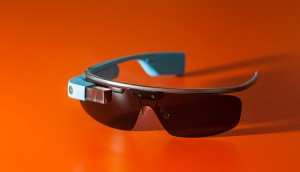Tags
Related Posts
Share This
A New Set of Eyes

As Marcel Proust says, “The real voyage of discovery consists not in seeking new landscapes, but in having new eyes.”
Imagine watching video footage of Olympic athletes training, dance rehearsals, skateboarding tricks—all from a first-person point of view. Google Glass teases the possibility of seeing the world through somebody else’s eyes.
Last February, Google opened up a competition for the distribution of its new ‘glasses’ called Google Glass Explorer. In order to enter, contestants—who had to be US citizens over 18 and capable of throwing down $1,500 for a Google Glass—entered by tweeting at Google ‘#ifihadglass’ followed by a 50-word or less proposal. Google chose 8,000 winning tweets and began distributing Google Glass prototypes this spring and summer to the new “Glass Explorers.”
As Google Glass became a tangible reality, the question of how the new technology would affect journalism became unavoidable. Was this going to be the next new technology to shake the journalism world?
Tim Pool, a multimedia journalist who became well known for his live streamed footage of the 2011 Occupy Wall Street protests in New York City, received his Google Glass just days before heading to Turkey to cover the protests there last summer. What was most exciting to Pool about using Glass to film instead of other devices was obvious: Glass is hands free. Glass relies on Bluetooth or an Android to connect to the Internet, so Pool had to find ways to keep his streaming live (he often carries multiple SIMs so he can switch operators when necessary), but that did not detract from his excitement that he could film hands-free. In a Guardian article from July, Pool explains that, “when there’s a wall of police firing plastic bullets at you, and you’re running through a wall of tear-gas, having your hands free to cover your face, while saying ‘OK Glass, record a video’, makes that recording process a lot… easier.” The multimedia work that Glass has helped Pool to do—which he calls “mobile first-person” journalism—may not replace traditional broadcast journalism, but he can see it becoming an important supplement to journalistic storytelling.
Other winners of the Explorer program included several journalism professors who want to begin to explore how Google Glass might change multimedia storytelling.
Richard Koci Hernandez, a multimedia journalist and professor at the Berkeley Graduate School of Journalism, won access to Glass with the tweet, “#ifihadglass I would help reinvent Journalism as a professor at UC Berkeley.” Hernandez took to wearing his glasses as often as possible, and immediately realized their value in candid street photography. Hernandez told Time that “I finally feel like my eye is a camera.”
Jeremy Littau, an assistant professor of journalism and communications at Lehigh University and another Explorer, has also worked Glass into his classes. He intends to have his journalism students make mini documentaries using Glass to give a more personal perspective; a documentary about a runner, for example, would be very different if presented with footage taken from a pair of Google Glasses on the runner’s face.
“It’s a device made for the liberal arts,” Littau told the Chronicle for Higher Education. “The whole device is about putting you in the shoes of the wearer to experience the world through their eyes.”
While these Explorers are focusing on documenting the user’s experience of Glass, critics have brought up ethical issues with the new technology.
For Hernandez, who shared his iPhone photos via Instagram long before he had a camera at eye-level, the ethical issues behind subdued recording devices need not be the focal point of the future of Google Glass discussions. Glass makes a chirping sound when a photo is taken, and displays a camera icon on the outside of the glass when filming. Photography or filming on Glass is initiated by either voice command or pressing a button, so there are still clues to whether or not a Glass wearer is recording.
With multimedia news stories increasingly dominating online publications, the idea of literally seeing a story through the eyes of the person it’s about brings a new note of empathy to the news. As Pool says of his multimedia documentation, “I want to show what it’s like to be there as best I can.” Google Glass will probably help journalists show what it’s like to “be there,” and not necessarily only from their own perspectives. Glass also presents an opportunity to deliver a more objective version of the experience of those whose stories a journalist tells. As Hernandez quotes Marcel Proust on his website: “The real voyage of discovery consists not in seeking new landscapes, but in having new eyes.”






 Jackalope Magazine is the student magazine of Santa Fe University of Art and Design. Building on the interdisciplinary nature of our education, we aim to showcase the talent of our university and character of our city.
Jackalope Magazine is the student magazine of Santa Fe University of Art and Design. Building on the interdisciplinary nature of our education, we aim to showcase the talent of our university and character of our city.
Recent Comments